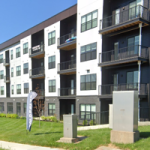ST. CHARLES COUNTY — Thirty years ago, St. Charles County voters created a special sales tax on online purchases and earmarked that money exclusively for the county parks system.
Now, some officials have said they’d like voters to allow the tax to be used for other purposes.
The problem, according to some in the county, is that the county budget has been “squeezed” in recent years. Expenses are increasing, especially staff salaries, which have risen by almost 50% over the past five years, and county officials plan on boosting them another 6% this year. Regular sales taxes, on items sold at brick-and-mortar stores, aren’t rising as fast as they have in the past.
Meanwhile, online sales taxes — the ones dedicated to parks — have more than doubled, jumping from $12 million in 2019 to a projected $28 million this year.
People are also reading…
Councilman Tim Baker, a Republican from Weldon Spring, is worried about flooding and wants to make sure the county is improving stormwater drainage. But he says the county doesn’t have a way to pay for the improvements. He’s looking askance at the dollars going to parks.
“I am sure splash pads are great,” Baker said in a meeting last month.
Baker wants to ask voters next year to take 10% of the online sales tax revenue, or roughly $2.8 million, for stormwater improvements.
Even St. Charles County’s interim finance director Bob Schnur said leaders need to be wary for the county’s future financial health and may need to ask voters to split the county’s park tax, likely in two years.
“The thing to watch as time goes on is what happens to the fund balance,” Schnur said.
These talks come as county leaders grapple with how they can bolster the county’s general fund, which is fueled by half-cent and quarter-cent sales taxes on purchases made at traditional brick-and-mortar stores. While those sales taxes have grown in recent years — from $45 million in 2019 to an estimated $60 million this year — county leaders say they worry it won’t be able to keep pace with all of the county’s expenses, including staff salaries.
In 2019, the county spent $93 million on about 1,100 workers. This year, the county expects to spend $137 million, a bump of $44 million or 47%, for about the same number of employees.
Preparing for hard days
This is not the first time that county leaders have eyed the parks tax with envy and considered how its revenue could be used elsewhere, said Joann Leykam, the county’s administration director.
“Historically, there have been conversations about the council going to the voters to split the parks tax for law enforcement,” Leykam said during a meeting last month. She said while past discussions never settled on a percentage of the split, “the consensus at that time was that the majority of the online sales tax should still go to the parks system.”
The current setup for the online sales tax has been a boon for county parks, providing millions each year for the purchases of new parks and maintenance of existing parklands.
The system includes some 4,400 acres across 23 parks. Among them are a new inclusive playground at Kinetic Park in Dardenne Prairie, the 126-acre Spring Bend Park that officials have touted as “an emerald in an otherwise concrete world,” Broemmelsiek Park in rural Defiance and its popular astronomy tower, and the National Equestrian Center in Lake Saint Louis, a 54-acre horse park that the county purchased last December that includes three arenas and more than 500 horse stalls.
The park system also notably includes Smartt Field, the county’s airport near Portage Des Sioux. The airport was moved to the parks department from the county’s highway department after county officials decided to use the airport as a source of tourism and recreation rather than a transportation hub.
Schnur said the county, which has about $300 million in reserves, needs to be careful that it matches expenses and revenues going forward. When times get tough, he wants the county to be ready.
“St. Charles County was not ready for the recession in 2008, and some drastic measures had to be taken in order to survive,” Schnur said. “We’re talking about a hiring freeze, layoffs, cutting department spending — stuff no one likes to talk about.”
For the time being, Schnur and other county officials have stressed that the county is not deficit spending and that “we can afford everything for now.”
But officials, he said, need to consider soon taking some of the parks taxes for the health of the general fund.
Salary raises are important, he said. They fend off other governments looking to coax county workers away amid an ongoing “war for talent” that has left hundreds of government positions unfilled across the region.
View life in St. Louis through the Post-Dispatch photographers’ lenses. Edited by Jenna Jones.









